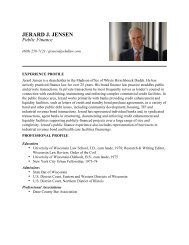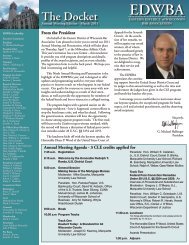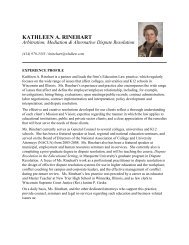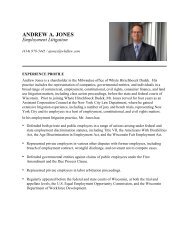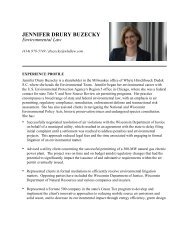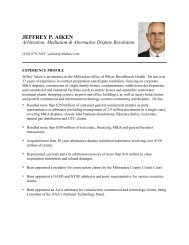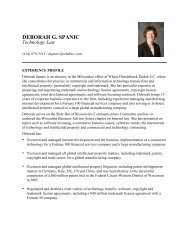FORETHOUGHT - Whyte Hirschboeck Dudek SC
FORETHOUGHT - Whyte Hirschboeck Dudek SC
FORETHOUGHT - Whyte Hirschboeck Dudek SC
Create successful ePaper yourself
Turn your PDF publications into a flip-book with our unique Google optimized e-Paper software.
EXPANDING YOUR BUSINESS<br />
ABROAD—A FEW BASICS<br />
Written by<br />
Daniel B. Geraghty<br />
As technology has made the world<br />
a smaller place, the reasons and<br />
opportunities for doing business abroad<br />
have become commonplace. Whether<br />
the expansion is a marketing strategy, a<br />
manufacturing strategy, a supply strategy,<br />
or tied to another reason, businesses<br />
going abroad must be mindful of<br />
adjustments to the “norm” and to barriers<br />
or obstacles that they may face. A little<br />
“forethought” before making the move will<br />
go a long way toward avoiding problems.<br />
Following are a few basic legal and tax<br />
considerations for doing business abroad.<br />
Legal Barriers and Other<br />
Governmental Regulations<br />
This obvious question needs to be<br />
considered early on in the process. For<br />
example, portable generators that are<br />
made and sold in the United States may<br />
need to be fine-tuned for export to the<br />
United Kingdom. In addition, the model<br />
for selling in the United States—for<br />
example, through independent sales<br />
representatives—may not legally work in<br />
the United Kingdom or be a commonly<br />
accepted business practice.<br />
impose the tax as a back tax at the time<br />
of the sale unless the taxing authorities<br />
“approve” of the sale. On its face, an offer<br />
of no tax for 10 years sounds like a very<br />
attractive reason to expand in Nicaragua.<br />
The reality, which may not be readily<br />
apparent, may be completely different.<br />
Duties and Other Similar<br />
Transaction Taxes<br />
Many times, a duty will be charged on<br />
importing goods to a country. In addition,<br />
other transactional taxes will be imposed<br />
at various points in commerce. It is<br />
essential to understand their potential<br />
application. For example, while not yet<br />
prevalent in the United States, nearly<br />
all countries impose what is known<br />
as a value added tax (VAT). This is a<br />
tax imposed upon a sale of property<br />
throughout the commercial process with<br />
a series of credits that ultimately shift the<br />
burden of tax to the end user. Rates of<br />
20% are not uncommon. If a business<br />
sells to another business it is critical to<br />
understand that a credit is available and<br />
how to obtain the credit.<br />
Cultural Differences<br />
While some countries are markedly<br />
different than the United States, others<br />
are more in line with the ways of doing<br />
business here. Doing business in<br />
Germany, for example, is a relatively<br />
structured and known process. To expand<br />
in Brazil or certain other Latin American<br />
countries, however, is considerably<br />
different and the process can be uncertain<br />
at the start. For example, businesses<br />
expanding in the hospitality industry in<br />
Nicaragua are exempt from income tax<br />
for 10 years. However, if the business is<br />
sold before the 10 years, Nicaragua may<br />
CORPORATE 9



